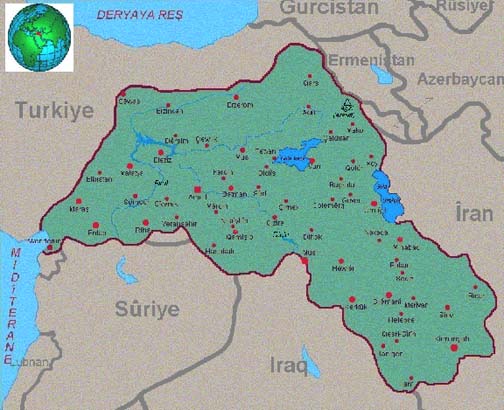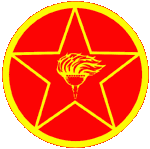Kurdistan Workers' Party (PKK)
Kongra-Gel
Freedom and Democracy Congress of Kurdistan
Halu Mesru Savunma Kuvveti (HSK)
KADEK
Kurdistan Freedom and Democracy Congress
Kurdistan People�s Congress (KHK)
Partiya Karkeran Kurdistan
People's Congress of Kurdistan
The People's Defense Force
Description
Kongra-Gel was founded by Abdullah Ocalan in 1974 as a Marxist-Leninist separatist organization and formally named the Kurdistan Workers� Party (PKK) in 1978. The group, composed primarily of Turkish Kurds, began in 1984 its campaign of armed violence, which has resulted in some 30,000 casualties. The PKK�s goal has been to establish an independent Kurdish state in southeast Turkey, northern Iraq, and parts of Iran and Syria. In the early 1990s, the PKK moved beyond rural-based insurgent activities to include urban terrorism. Turkish authorities captured Ocalan in Kenya in early 1999, and the Turkish State Security Court subsequently sentenced him to death, a sentence later commuted to life imprisonment following the abolition of the death penalty. In August 1999, Ocalan announced a "peace initiative," ordering members to refrain from violence and requesting dialogue with Ankara on Kurdish issues. At a PKK Congress in January 2000, members supported Ocalan�s initiative and claimed the group now would use only political means to achieve its public goal of improved rights for Kurds in Turkey. In April 2002 at its 8th Party Congress, the PKK changed its name to the Kurdistan Freedom and Democracy Congress (KADEK) and proclaimed a commitment to non-violent activities in support of Kurdish rights. In late 2003, the group sought to engineer another political face-lift, renaming itself Kongra-Gel (KGK) and promoting its "peaceful" intentions while continuing to conduct attacks in "self-defense" and to refuse disarmament. In June 2004, the group�s hard-line militant wing, the People�s Defense Force (HPG), which had taken control of the group in February 2004, renounced the PKK�s self-imposed cease-fire of the past five years.
Activities
Primary targets have been Turkish Government security forces, local Turkish officials, and villagers who oppose the organization in Turkey. The group conducted attacks on Turkish diplomatic and commercial facilities in dozens of West European cities in 1993 and again in spring 1995. In an attempt to damage Turkey�s tourist industry, the then-PKK bombed tourist sites and hotels and kidnapped foreign tourists in the early-to-mid-1990s. Turkish authorities have confirmed or suspect that the group is responsible for dozens of bombings that occurred throughout 2005 in western Turkey, particularly in Istanbul, but also in resort areas on the western coast where foreign tourists, among others, were killed. There also were dozens of military clashes between Turkish security forces and KGK militants.
Strength
Approximately 4,000 to 5,000, of whom 3,000 to 3,500 currently are located in northern Iraq.
Location/Area of Operation
Operates in Turkey, Europe, and the Middle East.
External Aid
Has received safehaven and modest aid from Syria, Iraq, and Iran. Syria and Iran appear to cooperate with Turkey against KGK in a limited fashion when it serves their immediate interests. KGK uses Europe for fundraising and conducting political propaganda.

Sources and Resources
- U.S. State Department Country Reports on Terrorism (2020)
- Amended Designation of Kurdistan Freedom and Democracy Congress as a Foreign Terrorist Organization, Federal Register, January 13, 2004.
- The Workers' Party of Kurdistan (PKK) - Turkish Ministry of Foreign Affairs
- A Report on the PKK and Terrorism Turkish Ministry of Foreign Affairs
- A Case Study of the PKK in Turkey / by Foundation For Middle East and Balkan Studies
- American Kurdish Information Network (AKIN) [unrelated to PKK]
- Kurdistan Human Rights Project [unrelated to PKK]
- aka Kurdistan [unrelated to PKK]
- Press Agency Ozgurluk Politics in Turkey: The Struggle for Human Rights, Justice and Democracy



